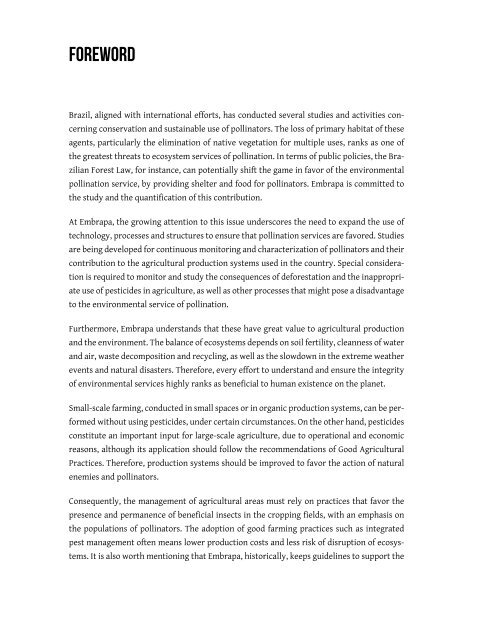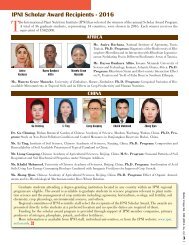SOYBEAN and BEES
BFhV4z
BFhV4z
You also want an ePaper? Increase the reach of your titles
YUMPU automatically turns print PDFs into web optimized ePapers that Google loves.
Foreword<br />
Brazil, aligned with international efforts, has conducted several studies <strong>and</strong> activities concerning<br />
conservation <strong>and</strong> sustainable use of pollinators. The loss of primary habitat of these<br />
agents, particularly the elimination of native vegetation for multiple uses, ranks as one of<br />
the greatest threats to ecosystem services of pollination. In terms of public policies, the Brazilian<br />
Forest Law, for instance, can potentially shift the game in favor of the environmental<br />
pollination service, by providing shelter <strong>and</strong> food for pollinators. Embrapa is committed to<br />
the study <strong>and</strong> the quantification of this contribution.<br />
At Embrapa, the growing attention to this issue underscores the need to exp<strong>and</strong> the use of<br />
technology, processes <strong>and</strong> structures to ensure that pollination services are favored. Studies<br />
are being developed for continuous monitoring <strong>and</strong> characterization of pollinators <strong>and</strong> their<br />
contribution to the agricultural production systems used in the country. Special consideration<br />
is required to monitor <strong>and</strong> study the consequences of deforestation <strong>and</strong> the inappropriate<br />
use of pesticides in agriculture, as well as other processes that might pose a disadvantage<br />
to the environmental service of pollination.<br />
Furthermore, Embrapa underst<strong>and</strong>s that these have great value to agricultural production<br />
<strong>and</strong> the environment. The balance of ecosystems depends on soil fertility, cleanness of water<br />
<strong>and</strong> air, waste decomposition <strong>and</strong> recycling, as well as the slowdown in the extreme weather<br />
events <strong>and</strong> natural disasters. Therefore, every effort to underst<strong>and</strong> <strong>and</strong> ensure the integrity<br />
of environmental services highly ranks as beneficial to human existence on the planet.<br />
Small-scale farming, conducted in small spaces or in organic production systems, can be performed<br />
without using pesticides, under certain circumstances. On the other h<strong>and</strong>, pesticides<br />
constitute an important input for large-scale agriculture, due to operational <strong>and</strong> economic<br />
reasons, although its application should follow the recommendations of Good Agricultural<br />
Practices. Therefore, production systems should be improved to favor the action of natural<br />
enemies <strong>and</strong> pollinators.<br />
Consequently, the management of agricultural areas must rely on practices that favor the<br />
presence <strong>and</strong> permanence of beneficial insects in the cropping fields, with an emphasis on<br />
the populations of pollinators. The adoption of good farming practices such as integrated<br />
pest management often means lower production costs <strong>and</strong> less risk of disruption of ecosystems.<br />
It is also worth mentioning that Embrapa, historically, keeps guidelines to support the






